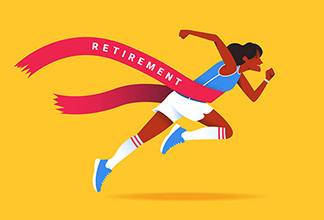5 Questions New Grads Should Ask Themselves
Written by Jaclyn Law
Published on July 8, 2021
minute read
Share:
This article was last updated in May 2024.
It's that time of the year again – across the country, fresh-faced graduates are attending convocation ceremonies and starting to plan out their futures.
However, this year's graduates face some financial challenges that others may not have in the past. Inflation remains elevated, a recession may still be on the horizon and technologies such as artificial intelligence are changing the way people think about work.
While there's no reason you can't thrive in your post-university careers, it doesn't hurt to get some help navigating your current reality, either. Kelley Keehn, author of Talk Money to Me: How to Save, Spend, and Feel Good About Your Money, shares some financial questions graduates may want to consider.
- "How can I adapt my plans?"
While the world adapts to higher (but declining) inflation rates and continued economic uncertainties, grads may need to rethink their career plans. "Ask yourself what the marketplace is offering right now – what are the opportunities and challenges," she says. "You can still achieve your long-term goals, but you may have to be more resourceful. It will come, but instead of getting defeated, you've got to have a three-point plan for the short, medium and long term."
- "What can I do to manage my student debt?"
About 1.9 million Canadians owed the government a collective $23.5 billion in student loans as of July 2022 according to Statistics Canada – and that number is even higher when you factor in provincial and private debt. Keehn encourages grads to look for relief. "I hear so many graduates say, 'Oh, I have so much student loan debt!' and they resign themselves," she says. "Be proactive. Can you get a better interest rate from your bank? Can you get a reprieve from the government? Really digging into your debt is essential."
- "Where can I cut back on spending?"
Instead of asking people to make a budget – "I don't like using the B word, says Keehn"– she recommends her 30-Day Anti-Budget: tally up your purchases for 30 days, on paper or using an online budgeting tool. "It's an exercise in behavioural awareness. Dig into everything: cell phone payments, subscriptions. See where your money's going and where you can trim the fat," she suggests. "Many people say they can't afford a TFSA or RRSP, and then they do the 30-Day Anti-Budget and are like, 'Whoa, I didn't know I was paying so much in credit card interest.' One reader realized he was spending $3,200 a year on Diet Coke."
Repeat the exercise once or twice a year. "People have fun doing it. Make it a challenge with a friend," she says. Finding ways to save will also help you achieve another important financial task: creating an emergency fund to eventually cover at least three to six months of expenses. "That may be an overwhelming amount for a new grad, but if you can, start with a few hundred dollars and build it up to a few thousand," says Keehn. "It'll be tough for a little while, as you build that emergency account, but you'll sleep better at night."
- "How can I make saving a habit?"
Start saving up money, even if it's just a small amount per month, says Keehn. "Every financial expert will say 'make sure you pay off your high-interest debt' – yes, absolutely, but there's something to building even a small amount of wealth, and these positive habits will take you into the future," she adds. "Even if you have debt, put away just $25 a month, to make yourself feel good and build that habit."
Automating your savings can be easy and efficient. Keehn points to NOMI Find & Save1, a feature in the RBC Mobile app2 that uses predictive technology to help you save – it finds money it thinks you can spare and automatically sets it aside for you as savings. By the end of the year, it can be exciting to see how these savings can add up to help you with your future goals.
- "How can I help my future self?"
One reason people find it hard to save money is that we tend to see our future selves as strangers – and we're not likely to make sacrifices for people we don't know. "We live with a present bias, and that makes it very easy to want to do everything now and not think about our future self," explains Keehn.
To counteract that bias, she encourages people to envision their future self in detail. "Something I ask everyone to do, whether it's a new graduate or a 40- or 50-year-old, is to think about yourself in five to 10 years. Write down your age – if you're 21, you'll be 26 in five years. Be really specific: What will you be doing? Where will you be living? What do you look like, and how much money will you need? Do that for five minutes a day, a couple of times a week, and you'll get to know your future self."
This exercise can motivate you to balance your purchases today with what you want down the line. "If you don't build that relationship, your future self is just a stranger you don't connect with," notes Keehn.
Bonus tip: Keehn also encourages grads to cultivate their knowledge of personal finance. "I get so upset when I hear people say, 'Money's not my thing,'" she says. "I know it can be overwhelming and confusing, but it's too important to leave your finances to someone else. Be interested and make it a lifelong passion."
RBC Direct Investing Inc. and Royal Bank of Canada are separate corporate entities which are affiliated. RBC Direct Investing Inc. is a wholly owned subsidiary of Royal Bank of Canada and is a Member of the Canadian Investment Regulatory Organization and the Canadian Investor Protection Fund. Royal Bank of Canada and certain of its issuers are related to RBC Direct Investing Inc. RBC Direct Investing Inc. does not provide investment advice or recommendations regarding the purchase or sale of any securities. Investors are responsible for their own investment decisions. RBC Direct Investing is a business name used by RBC Direct Investing Inc. ® / ™ Trademark(s) of Royal Bank of Canada. RBC and Royal Bank are registered trademarks of Royal Bank of Canada. Used under licence.
© Royal Bank of Canada 2024.
1 The NOMI Find & Save Service will transfer funds from your designated source account to your NOMI Find & Save Account. The source account must be an eligible Royal Bank of Canada Canadian personal chequing account.
2 RBC Mobile is operated by Royal Bank of Canada, RBC Direct Investing Inc. and RBC Dominion Securities Inc.
Any information, opinions or views provided in this document, including hyperlinks to the RBC Direct Investing Inc. website or the websites of its affiliates or third parties, are for your general information only, and are not intended to provide legal, investment, financial, accounting, tax or other professional advice. While information presented is believed to be factual and current, its accuracy is not guaranteed and it should not be regarded as a complete analysis of the subjects discussed. All expressions of opinion reflect the judgment of the author(s) as of the date of publication and are subject to change. No endorsement of any third parties or their advice, opinions, information, products or services is expressly given or implied by RBC Direct Investing Inc. or its affiliates. You should consult with your advisor before taking any action based upon the information contained in this document.
Furthermore, the products, services and securities referred to in this publication are only available in Canada and other jurisdictions where they may be legally offered for sale. Information available on the RBC Direct Investing website is intended for access by residents of Canada only, and should not be accessed from any jurisdiction outside Canada.
Explore More

Should I Invest or Pay Down My Mortgage?
Consider these four questions
minute read

As Many Head Back to the Office, Where Could Investors See Changes?
How returning to in-person work could affect a range of investments
minute read

Considering the FIRE Lifestyle? Here’s What Your Investments Might Look Like
We asked three people how they created financial independence and retired early
minute read
Inspired Investor brings you personal stories, timely information and expert insights to empower your investment decisions. Visit About Us to find out more.







